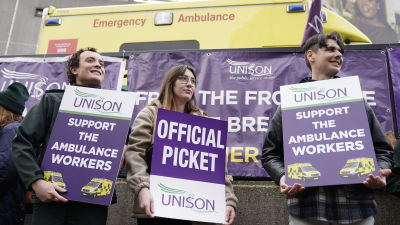Ambulance workers in England announce two further strike dates in New Year

Ambulance workers in Unison are to stage two fresh strikes in the dispute over pay and staffing, it has been announced.
Members of the union in five ambulance services in England will walk out on January 11 and 23.
The strike will affect London, Yorkshire, the North West, North East and South West and follows action by members of three ambulance unions on Wednesday.
Unison said the new strikes were a direct result of the government’s "repeated refusal" to negotiate improvements to NHS pay this year.
The January strikes will each be for 24 hours from midnight to midnight and involve all ambulance employees, not just the 999 response crews, as was the case on Wednesday.
Health Secretary Steve Barclay infuriated union leaders on Wednesday by saying they had taken a "conscious decision" to harm people.
Many of the services’ employees are likely to be exempted from the action, under emergency cover plans to be drawn up locally by each ambulance employer, working with Unison, said the union.
Unison General Secretary Christina McAnea said the walkouts will only end "through talks," adding "no health workers want to go out on strike again in the new year".
Want a quick and expert briefing on the biggest news stories? Listen to our latest podcasts to find out What You Need To Know.
"But accusing NHS staff of making a conscious decision to inflict harm on the public by taking action this week was not the health secretary’s finest hour."
She added: "The government must stop using the pay review body as cover for its own inaction. This year’s pay rise simply wasn’t enough to halt the exodus of staff from the NHS."
Unison's announcement of further industrial action comes as trust leaders have warned that Christmas could be one of the darkest to date for the health service.
Health chiefs are working to mitigate the impact of industrial action alongside having to contend with an "incredibly long list of other serious challenges", NHS Providers said.
Figures for last week show that one in four ambulance patients in England waited more than an hour to be handed to A&E teams at hospitals, while new data suggests patients in hospital with flu in England has "skyrocketed" and Strep A is driving "near record" demand for NHS 111 services.
One ambulance worker described as "excruciating" the pressure faced by trusts - most of which in England have declared critical incidents this week, meaning they are facing such disruption that the environment might not be considered safe and patients might come to harm.
Another said strike action was not what ambulance workers wanted "but this is what we have to do".
Saffron Cordery, interim chief executive of NHS Providers, said: “Today’s announcement of two more strike dates by a wider range of ambulance workers in January will add even more pressure to an already challenging situation following strike action by nurses and ambulance staff earlier in the week.
“We’ve already seen significant disruption to patient services with thousands of appointments being rescheduled or cancelled, with the fallout from this week’s strike action likely to be felt for days to come.
“And we know that ambulance staff don’t want to be striking either, but feel driven to take this step.
“The potential to continue to escalate action and for prolonged, co-ordinated strikes by more health unions in January if talks – including on pay – don’t take place is incredibly worrying.
“There are no winners in this situation. Serious talks must take place between health ministers and unions, and fast.”